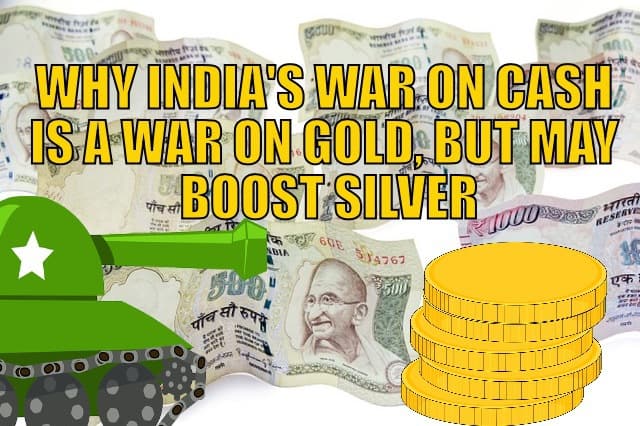In this video JS Kim of SmartKnowledgeU discusses Modi’s war on gold, disguised as a war on cash and a war on corruption. He also discusses the latest banker raid on gold and silver, and how low gold prices will go before rebounding.
He believes this recent fall in gold and silver will be a short term buying opportunity and unlike 2015 not a reason to stay out of the precious metals markets altogether.
His view is this is a correction in what is the very early stages of a resurgent bull market in gold and silver.
[canvakala-video src=”https://www.youtube.com/watch?v=hbZV8qfrcM0″ skin=”skin1″ width=”500″]Via SmarktKnowledgeU
This video was actually posted on 29 November. Since then gold and silver have fallen further. But have in the past few days bounced higher. So perhaps they are trying to put in a bottom finally.
Why Silver May be Boosted as a Result of the Indian Government
The Daily Bell outlines how silver imports have risen markedly in Indian over the past couple of years, as a response to the government’s gold import tariffs:
Following the recent import tax hikes for gold, 2015 saw Indian silver imports grow to almost 8,000 tonnes, 14% up on the previous 2014 record. At the same time, demand for gold jewellery, which accounts for 75% of all Indian gold demand, is down 30% for the 12 months to the end of September 2016, according to the World Gold Council. This points to a possible shift back to silver as a more prominent investment in India.
We’ve reported previously that anti-cash movements might spill over into gold, though not silver. In fact, the government is indeed trying to retard gold purchases, and it is possible there are more moves to come. If so, silver would likely benefit.
Conclusion: Upcoming salary payments in India may well exacerbate the current cash crisis and cause a good deal more violence. Such a scenario may kick-start an ascension of silver prices against the dollar that might spread well beyond India. The longer India’s cash crisis is perpetuated, the more likely it is to spill over into precious metals, especially silver.
It’s possible the Indian Government’s actions may put a further dent in gold in the short term at least. However as JS Kim outlines in the video above, when there was large buying going on in the Indian physical precious metals markets, this did not have a corresponding effect on the paper gold and silver markets globally.
But the below article makes a good argument as to how the Indian Governments actions may lead to even further increases in the purchase of silver in India:
Buy Silver — May Replace Gold as Money in India
The Indian government has been trying to reduce its citizens’ demand for imported gold as part of a wider crackdown on currency used in the black market that includes the withdrawal and replacement of its two largest-denomination bank notes. The strategy will likely have some unintended consequences.
Indians’ famous love for gold has created serious and ongoing economic issues for the nation. In 2011, Australian investment bank Macquarie estimated that 78% of India’s household savings were held in gold.
In effect, this means that India has a dual currency system where people choose to save mostly in gold rather than rupees. This is unlike any other major economy and begs the question: How do you wean a population off a precious metal?
The author discusses how saving in gold rather than bank deposits creates a permanent drag on India’s growth and the unintended consequences, and concludes that even a small substitution from gold to silver would result in a massive increase in the price of silver. A 10% reallocation from gold jewelry investment to silver in India would nearly double world silver jewelry demand. Mines and other sources would not be able to fill the gap immediately; prices would rise, further fueling demand and creating a new, shiny headache for those trying to marshal India’s unusual economy.
Related content you might like to read: War on Cash – Implications for New Zealand

